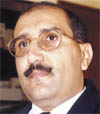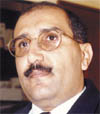
Mr. Khalid al-Rowaishan to Yemen Times: Publishers print books to help cultivate Yemen’s cultural scene [Archives:2003/07/Interview]
February 17 2003

Q: What’s the role that your organization had played in support of the cultural movement in Yemen?
A: The General Authority for Books has refreshed for the first time the contemporary cultural intellectual and talented movement that started in mid-90s. So during the past five or six years this organization represented the gate through which the light of the cultural movement has appeared to go beyond the country, into the borders to the world.
Q: What have you played in support of the youth?
A: Most of the publications of our organizations are focused on youth production, notably the production of the creative youth whose first works were published by the organization which sponsored the creative youth literature. We consider our organization as the first station for youth’s ambitions.
Q: What about the publications that your organization has achieved since its establishment so far?
A: Within this year we are about to chive our one hundred title project that we started four years ago. The ministry of information and culture had sponsored this project in the seventies but it could only achieve small par of it. So we feel proud that we have achieved this project within four years. This project will include all sorts of creative writing, notably the cultural production.
Q: It is noticed that you have been focusing on poetry and prose more than the other literature fields. Comment.
A: Actually most publications and literature production that is published by our organization or by others is mainly poetry or prose. Eighty per cent of all publications are poetry or prose. Most Arab countries publications are either poetry or prose as well.
We welcome all creative production of any sort and a any subject conditioned to be written in good structure, rational thoughts and to make sure that the author had made clear efforts in writing his book or that the book does not contain any plagiarism. We seek to show the uncovered side of the Yemeni creative work, as Yemen was isolated and its literature and creative work were unknown to the world until the nineties of the last century when the first Yemeni publications started to appear after decades of deprivation.
Moreover the organization focuses on literature and creative works trying to present the real visage of Yemen, especially since most Arab media have been publishing negatively about Yemen. We try to present the uncovered pretty part of the country represented in the creative work.
We also try to come to a balanced atmosphere between the political and informational activities and the literature activities, knowing that the political and informational activities have been dominating all other fields having the lion share in the mass media, while literature and creative works are not covered by the media.
Therefore we focus on literature and creativity more than other fields such as politics and science, putting into consideration that there are lots of universities and research centers that can cover these aspects.
Q: What about the role of your organization in sponsoring and publishing works for foreign creative writers?
A: We have gone beyond the creative issue in Yemen to cover some Arab and foreign creative writers. We have published some books for some Iraq and Syrian creative writers. We also started this year to publish some universal novels that were translated by Yemeni intellectuals, such as Almaha Baharta which is a story of an Indian legend translated by Dr. Abdul Wahab al-Maqaleh, an Indian book entitled ‘Silence is a Spiritual Sport’ and a book on Sana’ani song written in French by he French oriental author Jan La Meniere.
We also published a number of Arab poetry and prose works. This manner did not exist before as we in Yemen used to publish books that is written by Yemenis or focused on Yemen. Now we publish Arab and universal literature aiming to contribute in making communication between our culture and other cultures.
Q: What standards do you adopt for accepting a certain creative production to be published by your organization?
A: Actually there is a special committee that is in charge of reading and evaluating the texts and then approving them. This committee is comprised of the head of the organization, his deputy and a number of intellectuals and writers. No book can be published unless it is approved by this committee. Among the main standards is the correct grammatical structure, which is a main condition for accepting any work whether it was written in classical or contemporary style.
Q: What facilities do you provide for researchers?
A: The book house of Sana’a plays a key role in presenting facilities for all Yemeni and foreign researchers giving them a chance to loan some historical books and documents as well as newspapers and periodical magazines etc. The books General Authority for Book is also about to finalize the index of all books and documents that it has in all its libraries and computerized these indexes in order to facilitate for researchers and readers getting to the proper topic or book easily.
Q: To what extent has your organization has participated in the various regional and Arab book exhibitions and other related activities?
A: The Book organization has been playing a key role on this respect. It is well known that this organization had never participated in any of such exhibitions five years ago. However since 1998 we started participating in different book exhibitions and now after the organization production had increased you will find that Yemen’s section at any book exhibition is full with a number of valuable books and publications.
Q: What is the role of your organization in searching for the old Yemeni manuscripts and publishing them?
A: Concerning old manuscripts, we think that there should be a specified professional authority that should deal with such important issues. This authority should have good resources so as to be able search for the different manuscript icons and purchasing them from citizens. The researchers and concerned people of such fields should participate in searching for such manuscripts and when they find that a certain manuscript icon should be published, we won’t hesitate to publish them.
Q: Finally you are a great writer, Khalid al-Rowaishan. Through your position in this organization, have you achieved your goals in bringing Yemen into the Arab cultural map?
A: I think that the three axes that our organization is focusing on have succeeded in achieving our goals. These three axes are publishing books, establishing more libraries in all governorates and the activities of the cultural house.
For the first axis, we as I mentioned above are about to reach the 100th title which we think is a good achievement in a limited time.
As for the second axis, we are proud that we have established 20 libraries in the various governorates and cities of Yemen.
And as far as the third axis goes, the culture house has been playing a key role in sponsoring the various cultural activities covering plastic art, theater, cinema, singing and other related arts.
——
[archive-e:07-v:2003-y:2003-d:2003-02-17-p:./2003/iss07/intrview.htm]


